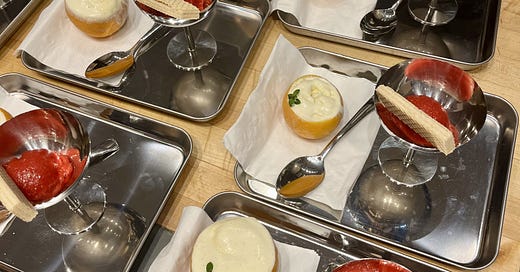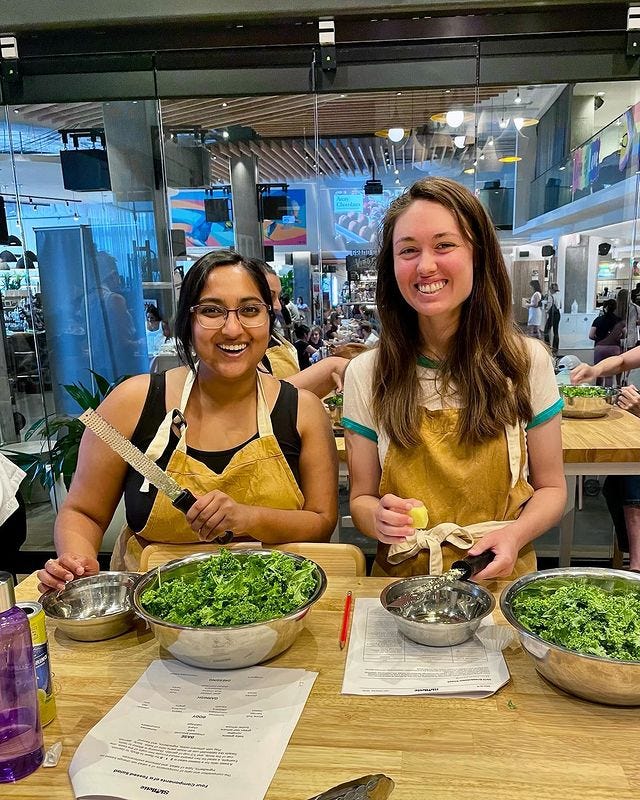It’s August! I’m busy layering slices of tomatoes on mayo-swiped toast and eating peaches that drip down my arms. Really important things, you know.
This month’s newsletter is giving a little back-to-school. I’m thrilled to share an industry interview with Kelly Singer. Kelly is the founder of Skillette, a cooking school for home chefs located at La Cosecha market in the Union Market neighborhood.
I met Kelly last summer when she was running her prior business, Kinfood, a space for home cooking classes and events. She hosted a salad composition class that reviewed three different salads highlighting key flavors: salt, fat, acid, heat, and umami. She had this great wheel graphic showing how the five flavors connect and complement each other. This felt different from other cooking classes. This focused on technique and foundations rather than just an Instagram-worthy end product (although, Kelly nails this too).
Kelly has launched so much since we met last summer. She transformed her prior home cooking, pantry goods, and events business into Skillette, an incubation kitchen for home cooks to thrive and learn from chefs in the area.
I hope you enjoy this interview about her journey navigating a career in the food and beverage industry!
What sparked the idea for Skillette? How have your previous food education projects led to this business?
Before COVID, I worked as an operations consultant and lost my job overnight like many people when the pandemic hit. Living on the West Coast, I loved visiting farmers markets, which were also shut down, leaving farmers with surplus produce. Seeing this, a friend and I launched Roquette Food Club, a curated CSA (Community Supported Agriculture) delivering boxes of organic fruits and veggies to friends and neighbors. We sourced produce directly from farmers, sometimes including recipes that used all the box's contents. Using wooden wine crates for delivery, it was a beautiful, boutique operation and a labor of love.
As demand grew, we decided to transform Roquette Food Club into a business. We switched to insulated, reusable bags to maintain a zero-waste approach and hired a full-time chef to create weekly recipes. Renaming ourselves Kinfood, we expanded to four cities and launched in DC in 2021. To scale further, we franchised Kinfood and added in-house pantry goods, cooking classes, dinners, and events. However, the economic boom of 2021 was followed by unforeseen inflation and a downturn in 2022, particularly in food and fuel costs. Facing these challenges, we ultimately closed the business.
I took a year off to reflect on Kinfood and let new ideas emerge. Spending the summer of 2023 in San Sebastian, Spain, I was inspired by Txokos—private culinary clubs where members cook together, take classes, and celebrate local, seasonal food traditions! This inspiration along with my learnings and ideas from Kinfood led me to create Skillette, a cooking school for home chefs.
With your background in business, how and why did you become interested in food?
I lived abroad in Paris with my partner and two small kids and before moving there, my primary interest in food was just eating it! However, in true Julia Child fashion, it didn’t take long before I was swooning away in the farmers markets and chumming it up with the cheese mongers.
Paris is one of the most dense cities in Europe - in a six mile diameter of the oval city there are over 2 million people. You can go out any day of the week, at any time of day, and there will be people out and things going on. You always feel inspired to get together with friends and have dinner parties or meet for a glass of wine. The convivial spirit of the city embraces meal times and gathering with friends and cooking is cherished as a way to work through stress rather than a cause of it.
They say when you live abroad, you actually end up learning more about your own culture than the one you’re in. I suddenly was able to see all the ways Americans are so obsessed with convenience, to the point that we almost worship it. Ultra processed foods make up nearly 60% of the daily calories consumed by US adults and almost 70% of what children eat. Three quarters of our population are overweight and 40% of that number are obese. I believe the difference between a place like America and a place like France is that many people there have a cooking skill set and most Americans don’t. That has so many downstream effects, like what’s available at the grocery store (have you seen all the kinds of fish you can buy in a French grocery store!?) to focusing on preventative healthcare through diet, to regulating higher quality, social, and environment standards for food. When we moved back to the states, I just felt like I had to do something in the food space.
What are your cooking classes like? Is DC a good market for this concept?
Everyone should be able to open up their pantry or fridge, grab a couple of things they see and be able to make dinner without a recipe. Our cooking classes operate more like a professional culinary school, where we teach skills, not recipes. There’s a place for recipe or dinner-style cooking classes, but that is not what we are. I want our students to leave with a versatile skill they can apply to a variety of ingredients and cuisines.
We’ve identified 59 skills that all home chefs should know. We offer 8-12 skills each season and switch our curriculum every four to six weeks. It’s my goal to create a place where people can come once a week to learn and be with other people who love to cook!
DC is such a welcoming community - chefs and business owners have been so helpful to me and organizations like Regarding Her DC, Les Dames DC, MAPP, and Cherry Bombe are huge supporters of women launching a business in food and hospitality. I’m very thankful for them! It’s a great moment in time to be doing something in food as DC is blossoming into an internationally recognized food hub.
What are some of the main hurdles you’ve had to overcome when starting this business?
Building an authentic community can take a long time, so I’m always giving myself pep-talks that I’m on the right path and just need to keep going when things seem slow or not going to plan.
As a pop-up cooking school, I’m packing up my car every weekend with all of our cooking equipment, gear, food, etc. unloading and setting up, then packing it back home. It’s a lot of work and very exhausting (maybe a little insane tbh) but I’m also learning what gets used and what doesn’t, how many of each item we need, what needs to be prepped ahead of time, etc. Having a detailed list of equipment and other things each class requires will be helpful when we eventually open our own space.
This might be TMI, but I also am just feeling older these days! I passed the 40-year-old mark and just can’t pull all-nighters like I used to. I need my rest! So I’m learning to work smarter, not harder.
Skillette is unique in that its curriculum is actually developed by real chefs in the DC area. What are some of the unique opportunities of working directly with chefs that other cooking classes might not have?
Skillette classes are based on a professional curriculum - skills that have been time tested and are part of a long culinary tradition. However, our chefs create our classes and make the skills very practical for home chefs and in class we use similar equipment to what students might have at home. We’re not using commercial ranges and giant stock pots.
There are a lot of professional practices that do benefit home chefs, though, like how to keep your workplace tidy (mise en place), care for your tools, how to measure in the metric system, and how to move safely around the kitchen. It’s also fun to get a little peek behind the curtain of DC’s beloved restaurants to learn how a particular dish or sauce is made from our chefs.
We have very high hiring standards for our chefs and we work collaboratively as a team to discuss the definitive way a skill should be taught based on culinary tradition but also science and experimentation.
What advice would you share with someone interested in breaking into this space who might not have a traditional background in the food and beverage industry?
There is always room for a new idea that serves a specific problem for a specific group of people. Follow your passion - what do you think is missing from the food scene? How do you wish things were different? What do you love about food? There are more people out there like you wanting the same thing than you probably realize! Start small and see what works. Keep at it for a long time. When you’ve got a good thing going then you can throw gasoline on the fire!
I’m incredibly grateful for Kelly making the time for this interview while she is in the thick of Skillette’s summer curriculum. Check out their upcoming classes!
DC restaurant week
I’m a slight restaurant week skeptic. Low-priced fixed menus means it’s usually a very rough week for front-of-house and back-of-house staff with very little return. RAMW, the organization that runs restaurant week manages a pretty heinous website whenever restaurant week rolls around.
However, as a consumer, it is undoubtedly a fun way to afford places you normally might be saving up for. A few tips for anyone in the DC area:
Compare menus. If the restaurant’s fixed price menu features a bunch of dishes not on their normal menu, that doesn’t mean the chef is trying to impress diners. It likely means those dishes are going to meet better margins.
Go big. Do not pick cheap restaurants! We are girl math-ing our decisions. Ask yourself, would I spend $55 or $65 for dinner if I went here on a normal night? You want to go somewhere that would likely surpass that amount.
Order big. Get the higher priced apps and entrees if everything's the same price. It’s time to order that crudo, red meat, and lush dessert.
Alternatively, go with what you know. Reveler’s Hour and Perry’s are going to be good any night, and you can expect the same during restaurant week.
A few places I’m looking into for the week:
Bar Spero - No menu yet, $65 for a three-course meal
Casa Teresa - $65 family style menu with tapas and choice of fish or pork entree
Cucina Morini - $40 three-course meal with some more basic options but still a great deal for the amount of food
Hiraya - $65 three-course meal with seasonal ingredients highlighted in Filipino dishes.
Namak - $55 three-course meal with most of their normal menu items
Pastis - No menu posted, but I’m always in favor of picking a Starr restaurant during restaurant week.
Reveler’s Hour - $65 three-course meal + their iconic garlic knot. The entire regular menu is available to order from which is SUCH a generous value.
The Duck & the Peach (see RAMW site) - $65 three-course meal also mostly seasonal dishes






